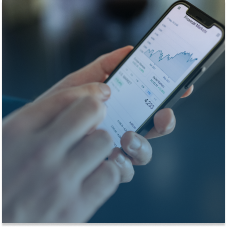How financial professionals can market their personal brand
This is the second in a series of two articles on branding and marketing for financial professionals. In the first installment, we looked at how to define and articulate your practice: finding your niche, scoping out the competition, and getting input from colleagues and clients. In this installment we explore finding a name, designing a logo, and telling the world—or at least your target client base—that you’re open for business.
Before Ray Croff launched his Mobius Financial Advisors in 2017, he hired a professional consultant to help him come up with a marketing strategy. But when Saba Khan was starting 1890 Wealth Solutions four years ago, she winged it.
Today, both Croff and Khan are successful, with established reputations in their respective communities, a healthy book of business, and multiple people working for them. And while Khan’s route probably involved more trial and error, their success is proof that either way can work.
Both say that significant investment in marketing is essential to the success of any financial professional. So, whether you are getting guidance from a professional or going it alone, it’s helpful to have some marketing savvy of your own before you start. Read on to learn what worked (and what didn’t) for Croff and Khan, and to find out what marketing experts say are some best practices for financial professionals looking to launch themselves in the industry.
What’s in a name?
Before you begin actively marketing yourself as a personal financial professional, think about how you see yourself, how others see you, and how you want to be seen. In other words, determine your brand. But then, how do you put that brand into action?
Coming up with a name and logo is a good place to start. Croff says his marketing consultant suggested the name Mobius Financial Advisors after he told her he wanted to serve clients throughout their whole lives, from “cradle to grave.” In mathematics, a Mobius strip is a never-ending loop.
Khan came up with 1890 Wealth Solutions herself. The year 1890, she says, is meaningful to her family because it’s when her first ancestor arrived in the U.S. from Pakistan.
“It has been a great name,” says Khan. “People ask about it, and it gives me an opportunity to have a conversation with them about generational wealth, about taking the long view.”
“The most important thing is that it feels authentic. It has to ring true. With financial advising, people are hiring you for you.”
Tom Barg, co-founder of the Chicago-based branding firm Keys & Kites, says you don’t necessarily have to come up with something creative or inspiring for your firm name. In fact, he says, the best name for a financial advising firm might be your own name.
“The most important thing is that it feels authentic. It has to ring true,” says Barg. “With financial advising, people are hiring you for you.”
As for a logo, don’t feel like you must pay a graphic designer a lot of money to come up with something elaborate, says Barg. Just make sure your logo is clear, crisp, and legible in a variety of sizes.
What channel?
Today there are so many channels for marketing your brand, it can be overwhelming to try to decide where to start.
There’s paid search, where you pay a search engine company to get your advertisement in front of their users. There’s content marketing, through which you provide helpful insights to potential clients, perhaps via email or a blog.
Bennett Kleinberg, founder of New York-based communications and media relations firm Jupiter Strategies, says that for an individual just starting out without a big budget, he would recommend leveraging LinkedIn’s offerings.
While many people think of LinkedIn as a place to find job opportunities, it has become a major professional marketing channel. Create a strong LinkedIn profile, linked back to a solid, professional website. Then start building your connections list and posting content.
Kleinberg says if you’re going to post on LinkedIn, it’s important to do so consistently—once a week or more. Build your network—aiming for 500+ connections—and make an intentional effort to cultivate that network.
Build a list of your most active connections and check in with them regularly—maybe send them a quick note every six months or so. Think about ways you can connect people within your network. Even as you grow your business and your promotional budget, LinkedIn can remain a vital part of your marketing strategy.
“LinkedIn is really rich and deep in services,” says Kleinberg. “I think it’s essential when you are starting out, but it can be a hub for more advanced tactics too.”
The personal touch
Croff cautions against relying too heavily on digital marketing options. He has been an active member of community groups such as the Rotary Club and the chamber of commerce for decades, and he estimates about 80% of his business has resulted from those personal interactions.
For example, after he served on an advisory board at his church, his pastor asked him to help sort out some thorny financial issues related to the sale of a business that had been in his family for 60 years. Today, that pastor’s personal testimonial about Croff’s steady, skillful guidance is featured on the Mobius website, along with the testimonials of a half-dozen other named clientsi.
Croff says he doesn’t think of his community activities as marketing so much as “prospecting,” and he estimates he spends about 60% of his time doing that. “Get out from behind the computer and meet as many people face-to-face as possible,” he advises.
Pandemic pivot
Khan, who was a relative newcomer to the Greensboro area when she launched 1890 Financial Solutions in 2018, began by offering free retirement workshops. The workshops quickly resulted in enough earned business to cover her costs, and she was beginning to establish a strong client base.
Then, the COVID-19 pandemic hit. In-person workshops were cancelled, and she had to come up with an alternative. So, she launched a podcast and bought airtime to have it broadcast on a local radio station twice a week. She says it was a fraction of the cost of hosting in-person workshops, and she believes it has been even more effective.
“The important thing about the podcast is that it’s not just one big sales pitch. It’s offering people real information that they can use,” says Khan. “People come to feel like they know you a little.ii”
Team up
But what if you don’t have deep roots in the community like Croff? Or a talent for talk like Khan?
Ann Hughes, an executive coach and founder of the Female Affect, advises some aspiring financial professionals to consider joining a team rather than launching their own firm. “It may give you an immediate boost,” says Hughes. Market yourself inside the team—maybe becoming the resident social media marketing expert, for example—while you’re also building your brand in the larger community, says Hughes. Eventually, you can build up your reputation enough that you’ll be able to go it alone.
"You just keep going. Someone will see your light and give you a shot."
“[Partnering with other financial professionals] may be a great way to get started,” says Croff. “Fifty percent of something is better than 100% of nothing.”
Khan says that no matter what route you decide to take, you should fully embrace it. “When I did my first workshop, I knew my voice was shaking. My brain was freezing,” she recalls. “But you just keep going. Someone will see your light and give you a shot.”
Your Thriving
Practice
A destination to empower financial professionals to build, manage, and grow their practice
Get started with Global Atlantic
Take the next step with a company that can help elevate your business.
Need help?
Find all the contact information to submit and service your business.











